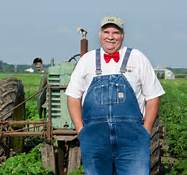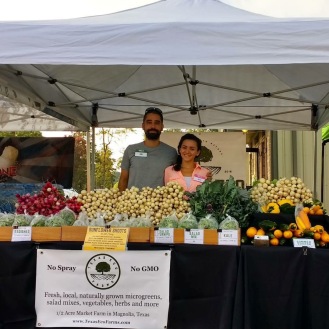Rarely a day goes by that I don’t see an article or news about small scale farming. People tend to get all warm and fuzzy about the thought of hand grown produce, free of pesticides, herbicides, and a host of other bacterial contaminants that I can’t spell. They love going to the farmers market in the hopes of actually meeting the prototypical, portly farmer in overalls, sitting next to his 50 year old pickup truck, selling you the best food nature can produce!
Well, I used to have the same thoughts so I started going to the local farmers markets. There’s one in my neighborhood and one at city hall during the week, across the street where I work. I went expecting to see people who work the land and take great pride in producing healthy, nutrient dense, all natural, GMO free food.
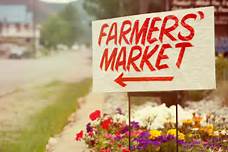
Boy was I ever wrong. What I saw was mostly a plethora of prepared foods, dried snacks, coffee, smoothies, food trucks, nick-nacks and candy sellers. I searched the area profusely and finally found someone with real live veggies and after talking to them, I found out they were a large farm that supplies grocery stores and they came to the market with stuff they couldn’t wholesale. Chemical free?? not a chance buddy, the word they used was “sprayed”. “We spray our produce to kill bugs and weeds”. Oh Great, “can I have some more round-up with that zucchini please??”
Needless to say all my warm and fuzzy feelings were immediately crushed like a gooey cockroach! I was actually pissed. But that got me to thinking. If there were too few purveyors of fresh chem free veggies, what was holding them back? Why would folks go to the effort to produce and sell all these prepared products at a farmers market, but not take advantage of living in Zone 9a and growing the best natural food in the world?
What I found out is that it is simply not financially feasible to compete with large scale production farms by selling the typical produce that people are conditioned to purchase for far less cost in the grocery store than they could actually grow it at home. This means that if people can buy organic carrots in the grocery store for $2 per pound, they’re simply not mentally able to purchase them direct from the farmer for $7 per pound, even if that means the local farmer sells at a loss. Once again, economics rule the world.
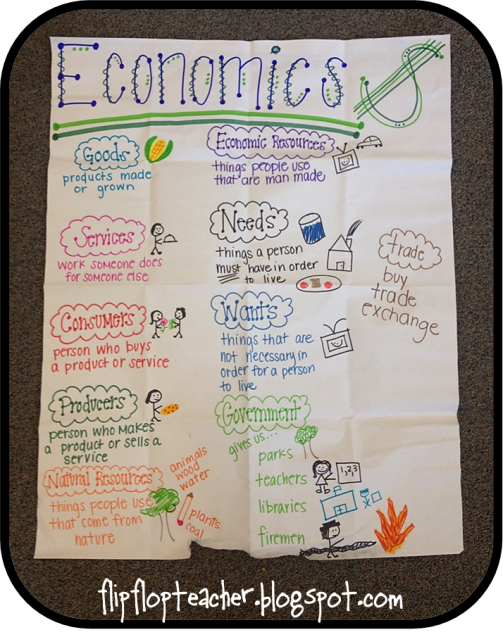
However, I did learn that profits can be made selling local produce, but it had to be specialty and rare crops along with certain produce that folks can’t easily purchase in the store. Especially greens, salad mixes, lettuce, Etc. because these items are more expensive due to the added harvest, washing, packaging and handling costs required to make them available in stores.
What’s so funny is that at the same time I was figuring all this out, a friend of mine was already starting his small scale farming business. Jim and I met back in 2014 at a TSP workshop in Ft. Worth. He’s a young guy but he’s highly knowledgeable in all aspects of growing, but primarily, this guy knows his soil. He’d started developing a small backyard farm on a property he’d leased and unfortunately, that deal started to fall apart on him with an unreasonable landlord.
We started talking about him possibly relocating the farm to my property in central Texas. While that discussion was going on, I invited him up to my place along with another friend of mine Steve, for a hog hunting trip. (This place is over run with feral hogs and if we shot one a day for a year, we probably wouldn’t put a dent in the population!)
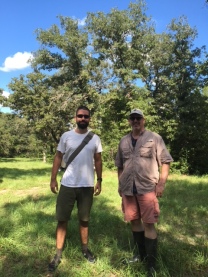
Jim & Mike
As it turned out, Steve lived on a large acreage property much closer to the city and he had a guest house he was considering fixing up and leasing out. Jim and Steve were able to work out a mutually beneficial lease and that summer Jim went straight into developing part of the property into a chemical free produce farm. What’s really incredible is how fast he turned the typical pasture dirt into an amazingly rich garden soil in less than six months. I couldn’t believe it unless I’d seen it myself! 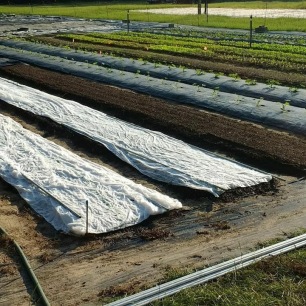
Jim’s farm is called TEXAS ECO FARMS and his first farming season started off this fall, with a Bang! He’s selling out almost everything he brings into the local farmers market and at specialty prices worthy of such high quality food. It really made me happy to see him prove there was profitability in small scale produce farming, if you understood the economics.
Now this is what I expect to see at a FARMERS Market!
Whats even better is that I now have a local source of incredible produce available to my family and we purchase a box about every other week. I actually discovered another valuable lesson.
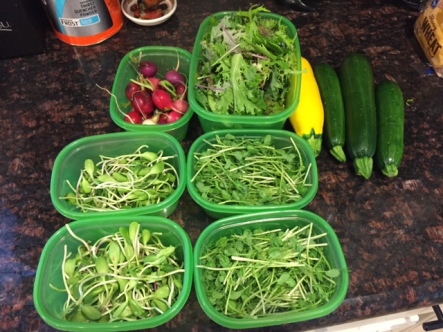
Hand grown, chemical free produce lasts weeks longer in the refrigerator than anything you can buy in the store! And that means you eat more and throw out less. This actually makes the cost differential much lower and it actually means there really isn’t a significantly higher cost to purchasing high quality produce vs. low end store bought!
I realize that the one factor that makes it hard to profit from farming in high costs of land. Land is expensive! In order to service the debt on a piece of land you’d have to farm large scale to afford the land costs. This is why so many farmers wind up in commodity farming. The market price is set and the math can be worked out ahead of time. Purchasing large acreage farm tracts lowers the cost per acre and specialized industrial tractors and equipment limit the labor costs. Subsidies from the USDA and low cost crop insurance insure low prices on food staples like flower, sugar, corn, soy, Etc. These are the only reasons produce is relatively cheap in stores across the USA.
All good if you want to produce corn or soybeans, but there are other economic alternatives versus commodity farming. But to do this you have to limit the land and labor costs, and plant in condensed plantings on smaller land parcels, Unfortunately, to profit, small scale farmers must also undertake the expense and effort of transport and marketing. I believe that this could be done more efficiently if more people could find high quality produce near their homes or at farmers markets or even through farm delivery services similar to amazon. Some suspect that the recent acquisition of Whole Foods Grocery, by Amazon, will lead to this exact model. Of course you still don’t know who grew it and how!
I’m committed to helping create more small, entrepreneurial businesses because I believe it diversifies the local economy and provides a more stable community. I see small scale farming as a great way to create more agricultural options in the market place. I also see healthy food as an investment in healthy people and we need more of that for sure.
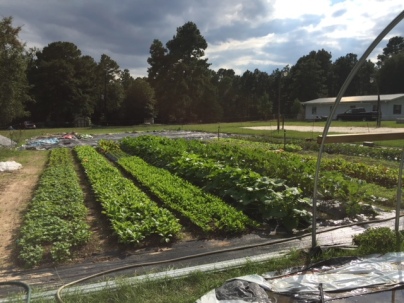
I’m still interested in helping set up a small scale farmer on my property and am looking for the right person who understands the marketing, distribution and economics, just as well as they understand the growing of soil and quality food. I believe I can craft a leasing arrangement that allows them earn enough to get through the start up phase with a low level of cash investment. Once profitable, modest land payments can be tied to production, thereby, adding insurance in case of crop failure. I believe there are also some great opportunities to barter produce for other assets like crypto-currency and create revenue from on-line and delivery sales. Its all hard work but I think some still find that rewarding these days.
If you know of any farmer candidates who might be interested in an opportunity like this, please send them my way. I’m willing to invest in the success of others simply because so many invested in me and my success over the years.
It’s a great way to build resilient and sustainable local economies and it is a wonderful way to eat great food from a farmer you actually do know!!
HEY! I’d really like to know what you think! If you like this post or the Blog in general, please comment. If you like this kind of stuff, sign up to follow the Blog as I explore the varied hobbies, work and interests intricacies of Mike Centex LIFE!
Thanks, Mike
